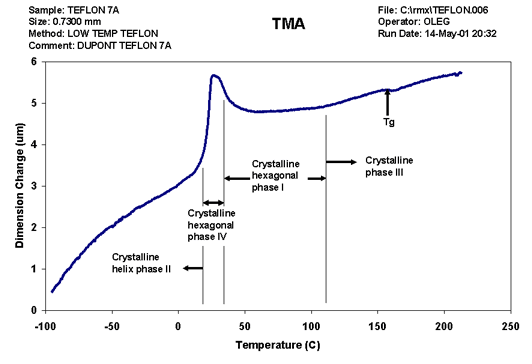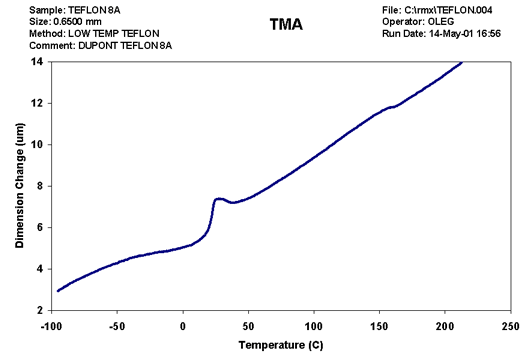Welcome to Anderson Materials Evaluation, where we specialize in thermal expansion testing (also known as CTE analysis) to provide precise measurements and insights into the thermal behavior of materials. Our expertise ensures the reliability and performance of materials across various industries by understanding how they expand and contract with temperature changes. In addition to CTE measurements, we also offer glass transition temperature testing and crystallization temperature testing to help you fully understand your materials’ thermal properties.
Understanding Thermal Expansion
Thermal expansion refers to changes in dimensions of a material in response to temperature variations. The coefficient of thermal expansion (CTE) quantifies this change. While the expansion is often nearly linear over a specific temperature range, materials may exhibit changed behavior due to phase transitions, such as passing through the glass transition temperature or a crystallization process.
Our Thermal Expansion Testing Capabilities
At Anderson Materials Evaluation, we use a state-of-the-art ThermoMechanical Analyzer (TMA) to conduct comprehensive thermal expansion testing. Our TMA capabilities include:
- Coefficient of Thermal Expansion (CTE) Measurements: Determining the CTE for various materials, ensuring their suitability for being coupled to another materials or used in a specific application.
- Glass Transition Temperature Testing: Identifying the temperature at which polymers and glasses transition from a more brittle, glassy state to a more flexible, rubbery state.
- Crystallization Temperature Testing: Assessing the temperature at which materials undergo crystalline phase changes, which affect their mechanical properties.
Advanced TMA Techniques
Our TMA dilatometer uses interchangeable probes at varied loads to measure multiple properties, including:
- Softening temperature or glass transition temperature
- Tensile and compression modulus
- Coefficient of thermal expansion (CTE)
- Melting and crystalline phase transition temperatures
- Creep under load
- Heat deflection temperature under load
These measurements are critical for materials such as polymers, metals, glasses, ceramics, and composites. Our equipment can test a wide range of sample types, including plugs, films, powders, and fibers.
Extensive Testing Range
Our TMA operates across a broad temperature range, from -150°C to 800°C. We accommodate samples with dimensions up to 15 mm in height and 9.5 mm in diameter, with ideal thickness for sheet materials between 1-4 mm. Minimum sample thickness is about 0.1 mm. Our precise load application, ranging from 0-100 g, allows us to study the softening behavior of materials under various pressures.
ASTM Test Methods
We adhere to recognized standards to ensure the accuracy and reliability of our measurements:
- ASTM D648: Standard Test Method for Deflection Temperature of Plastics Under Flexural Load in the Edgewise Position
- ASTM E228: Standard Test Method for Linear Thermal Expansion of Solid Materials with a Vitreous Silica Dilatometer
- ASTM E831: Standard Test Method for Linear Thermal Expansion of Solid Materials by TMA
- ASTM E1545: Standard Test Method for Assignment of the Glass Transition Temperature by TMA
Applications of Thermal Expansion Testing
Our CTE analysis and thermal expansion testing services support a wide range of applications, including:
- Industrial Equipment: Ensuring the reliability of components subjected to temperature fluctuations.
- Electronics: Investigating the thermal behavior of materials used in electronic devices.
- Polymers and Plastics: Analyzing the thermal expansion properties of various polymers to guide material selection and processing.
- Metals and Alloys: Measuring the CTE of metals to ensure their performance in high-temperature environments.
- Ceramics and Glasses: Assessing the thermal expansion characteristics of ceramic and glass materials to prevent failure in thermal applications.
Illustrative Example: Rapid Thermal Expansion of PTFE Crystalline Phase
Our TMA dilatometry capabilities were demonstrated in a study of various PTFE powder materials, pressed into sheets and measured from -100°C to 200°C. One sample showed a significant crystalline transition at approximately 19°C, transforming from a Phase II helix to a Phase IV hexagonal structure, and then to a Phase I hexagonal structure. This transition, indicated by a large peak, highlighted the substantial crystalline phase of the PTFE, exhibiting drastic dimension changes.
Another PTFE sample exhibited a smaller crystalline to amorphous transition, indicating a higher concentration of amorphous material. For our customer’s application, a rapid thermal expansion at the crystalline transition temperature was intolerable, necessitating the selection of an amorphous PTFE material.


Contact Us
At Anderson Materials Evaluation, we are dedicated to providing accurate and insightful thermal expansion testing services. Our team of experts is ready to help you understand and optimize the thermal behavior of your materials. Contact Dr. Priyanshu Banerjee at Priyanshu@andersonmaterials.com, call 1-410-740-8562, or visit our “Contact Us” page for more information.
Enhance your materials’ performance with our comprehensive CTE analysis and thermal expansion testing services. Reach out to us today to discuss your project requirements.
For more detailed information about our testing methods and capabilities, please visit our “Thermal Expansion Testing – An In-Depth Look” page.
